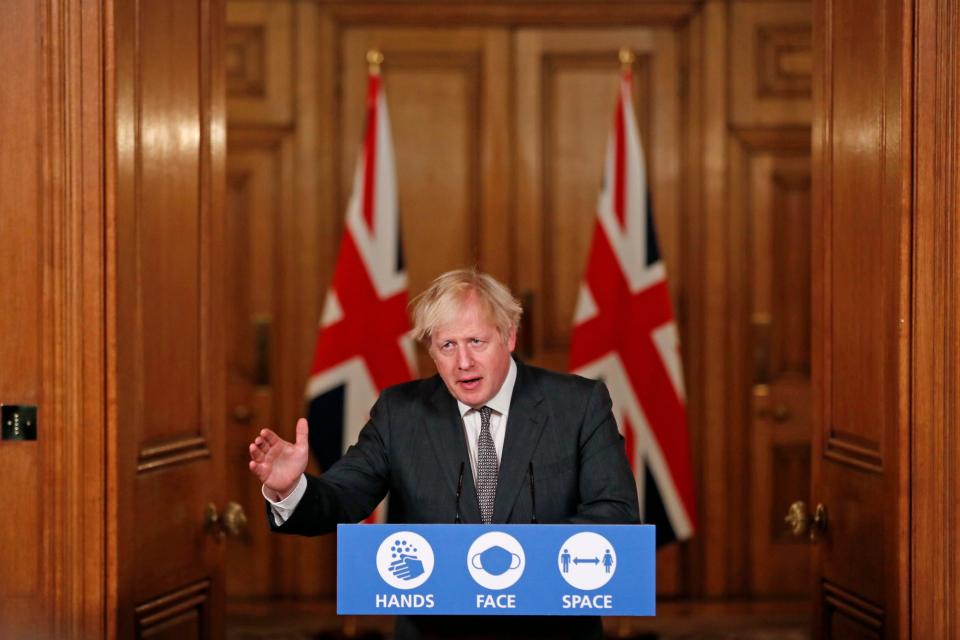UK prepares for end of Brexit transition period as trade deal enters into law with hours to spare

Britain is to begin the next chapter in its relationship with the European Union after Boris Johnson’s Brexit trade deal cleared parliament and entered into law in a single day with just hours to spare before the end of the transition period.
The prime minister said the country’s destiny "now resides firmly in our hands" after the government rushed through approval of a bill to ratify a long-delayed trade agreement reached with European leaders last week.
The legislation, which was passed by the House of Commons with an overwhelming majority of 448 votes, averted the possibility of a damaging no-deal exit from the bloc at the eleventh hour.
Peers then gave the European Union (Future Relationship) Bill an unopposed third reading before it was announced at 12.25am on Thursday morning that the legislation had been granted royal assent, officially signing the UK-EU deal into law.
Despite having formally severed ties with the EU on 31 January, the UK has remained a member of the single market and has been subject to all of the bloc’s rules while Brussels and London thrashed out a trading agreement.
With the Brexit transition period due to end at 11pm on New Year’s Eve, Boris Johnson succeeded where his predecessor, Theresa May, repeatedly failed, and convinced Tory MPs to back a deal he had agreed with the EU.
In a statement after the deal cleared parliament, Mr Johnson said: "I want to thank my fellow MPs and peers for passing this historic bill and would like to express my gratitude to all of the staff here in parliament and across government who have made today possible.
"The destiny of this great country now resides firmly in our hands. We take on this duty with a sense of purpose and with the interests of the British public at the heart of everything we do.
"11pm on the 31st December marks a new beginning in our country's history and a new relationship with the EU as their biggest ally. This moment is finally upon us and now is the time to seize it."
The Labour Party leader, Sir Keir Starmer, suffered a number of resignations from his front bench after he ordered Labour MPs to vote for the deal on the grounds that it was better than a no-deal outcome.
Before the historic vote, Mr Johnson told MPs that the agreement would bring “certainty” for businesses across the country following years of wrangling over the UK’s future trading relationship with the EU.
The move would reassert “global Britain as a liberal outward-looking force for good”, the prime minister said.
But the government also faced a backlash for ramming through the 85-page bill, which implements the 1,200-page trade agreement, in a single day.
Labour peer Lord Adonis described the move as a “gross abuse” of parliamentary process and claimed that ministers were treating the public with “contempt”.
During the debate, Sir Keir warned that the alternative to the deal struck by Mr Johnson was enabling a damaging exit from the bloc without a trading agreement.
He told the Commons: “Those that vote no are voting for no deal.”
“This is the nub of it: those voting no today want yes. They want others to save them from their own vote. Voting no, wanting yes, that’s the truth of the situation and that’s why my party has taken a different path.”
The Labour leader also attacked Mr Johnson for failing to be “straight” with the British public over his incorrect claim last week that there would be “no non-tariff barriers” to trade under the UK-EU agreement, despite the government already admitting that businesses will face additional red tape.
But almost a fifth of Labour MPs rebelled by ignoring the order to back the deal, in what will be seen as a blow to Sir Keir’s authority.
Two Labour MPs, Helen Hayes and Tonia Antoniazzi, resigned from their frontbench roles, saying they could not support the agreement.
Ms May, who suffered a series of damaging defeats on her government’s Brexit legislation, voted for the agreement but told MPs that she had offered them a “better deal” in 2019.
In a swipe at hardline Brexiteers in her own party who judged the success of the deal by the extent to which it frees the UK from entanglement in multilateral organisations such as the EU, she declared: “Sovereignty does not mean isolationism.”
However, the Scottish National Party’s Westminster leader, Ian Blackford, condemned the deal as “an act of economic vandalism” and attacked Labour for failing to oppose it.
“I am sad to say that the official opposition has been missing in action. I can understand that this might be politically pragmatic for Labour, but it definitely isn’t politically principled,” he said.
The European Commission president, Ursula von der Leyen, and the European Council president, Charles Michel, formally signed the UK-EU agreement, before it was flown to London on a RAF plane for the prime minister to sign.
After clearing the Commons and House of Lords, the bill will now go for royal assent when it will become law.
An opposition amendment criticising the "many shortcomings" of Boris Johnson's trade deal was rejected by peers by 312 votes to 213.
A Liberal Democrat attempt to prevent the legislation passing with a so-called fatal amendment was heavily defeated in the House of Lords by 466 votes to 101.

 Yahoo Finance
Yahoo Finance 